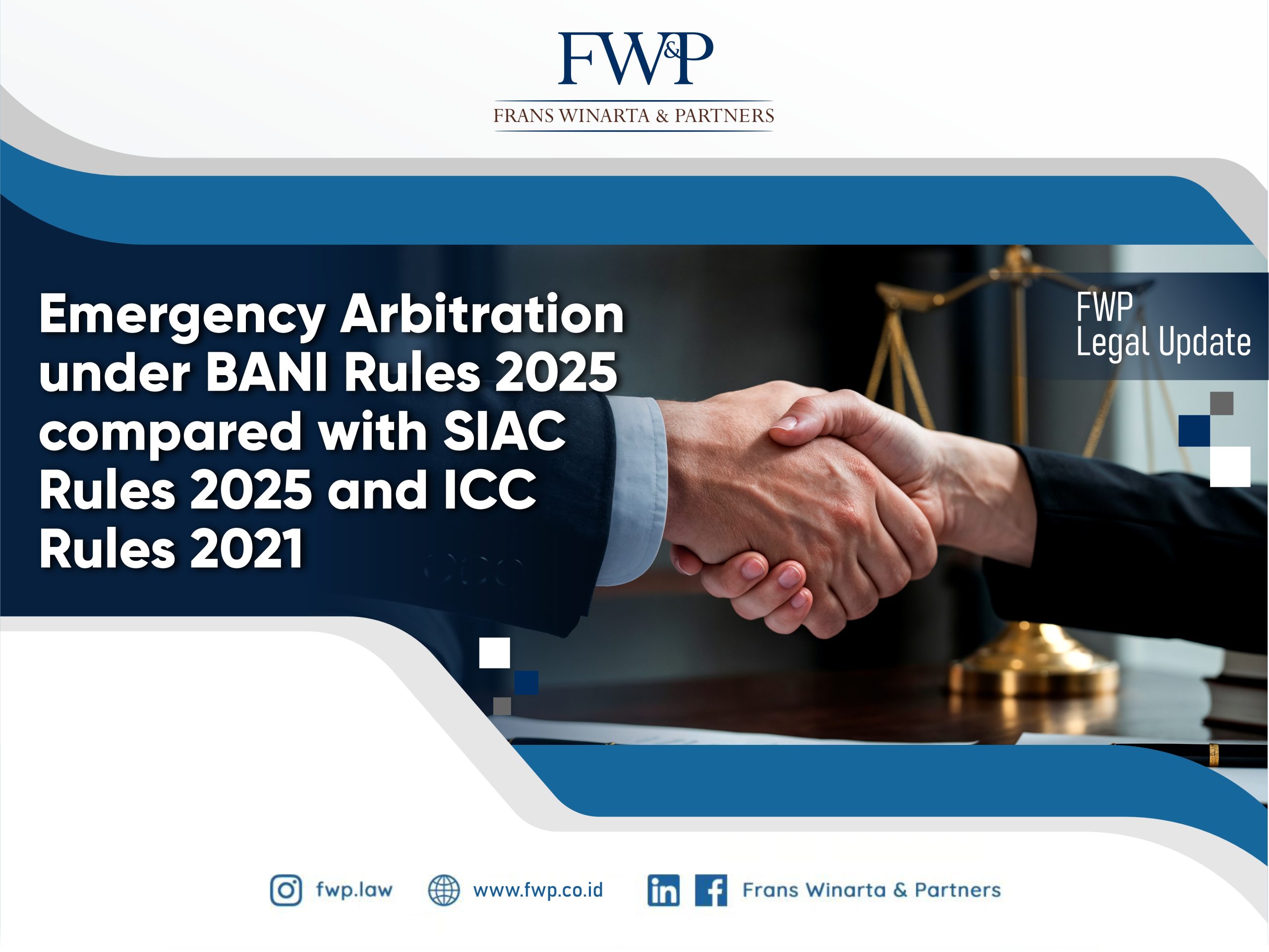Emergency Arbitration under BANI Rules 2025 compared with SIAC Rules 2025 and ICC Rules 2021

Recently, the Indonesian National Arbitration Board (“BANI”) has released its newest set of Arbitration Rules and Procedures for 2025 (“BANI Rules 2025”). The BANI Rules 2025 introduce several adjustment and advancements such as: (i) adjustment to consolidation, multiparty, and multi-contract arbitration; (ii) expanded grounds for challenging arbitrators; and (iii) emergency arbitration. This article will comprehensively discuss emergency arbitrator under BANI Rules 2025 compared with SIAC Rules 2025 and ICC Rules 2021.
The practice of emergency arbitration has been recognized and implemented by the Singapore International Arbitration Centre (“SIAC”) and the International Chamber of Commerce (“ICC”). In brief, emergency arbitration is an award issued prior to the commencement of the formal arbitration hearing due to the urgent need for a ruling in a dispute.
Emergency Arbitration is regulated under Article 17 paragraph 5 of BANI Rules 2025 and Attachment I on Emergency Arbitration Rules of BANI Rules 2025. The term used in BANI Rules 2025 is Emergency Arbitration. Furthermore, procedurally, the application is submitted to the BANI Secretariat. The BANI Chair will then appoint an emergency arbitrator within 2 (two) days. The first hearing will be held no later than 3 (three) days after the BANI Chair appoints the emergency arbitrator. The award must be issued within 14 (fourteen) days, with the possibility of an extension of 7 (seven) days. In short, the hearing period is 14 (fourteen) days from the appointment of the emergency arbitrator and can be extended up to 7 (seven) days at the discretion of the emergency arbitrator. The outcome of emergency arbitration based on BANI Rules 2025 is an award. An emergency arbitration award is final and binding, interim or conservatory in nature. One limitation of the provisions regarding emergency arbitration in the 2025 BANI Regulations is the lack of clarity regarding whether the main arbitral tribunal may or may not uphold, reconsider, modify, or annul the emergency arbitral award, thereby making the award no longer binding on the main arbitral tribunal. Furthermore, it must be determined whether the emergency arbitral award can be enforced against the disputing parties, including through other judicial institutions, if one party does not voluntarily comply with the emergency arbitral award.
Turning to the emergency arbitration provisions under the SIAC Rules 2025, these are set out in Article 12 of the SIAC Rules 2025 and Schedule 1 of the SIAC Rules 2025. The term used is emergency interim or conservatory relief. However, the context is the same, namely emergency arbitration. The emergency arbitrator must issue an order or award within 14 (fourteen) days after his appointment and may be extended at the discretion of the Registrar. The outcome of the emergency arbitration is an order or award and the order or award is binding – but may cease to be binding under certain circumstances. The main tribunal has the authority to confirm, review, vary, or annul the emergency arbitration order or award. The order or award will no longer be binding once the final award is issued, unless the main tribunal decides otherwise. An order or award is no longer binding once the final award is issued, unless the primary court decides otherwise.
Furthermore, if we look at the emergency arbitration provisions under the 2021 ICC Rules, emergency arbitration is regulated in Article 29 of the 2021 ICC Rules and Appendix V of the ICC Rules 2021. The term used is emergency measures – which of course has the same meaning as emergency arbitration as referred to in this article. The emergency arbitrator must issue an order no later than 15 (fifteen) days from the date on which the file was transmitted to it, and may be extended at the discretion of the President. The form of the result of emergency arbitration under the 2021 ICC Rules is an order – and such order is binding, but may cease to be binding in certain circumstances – just like in the 2025 SIAC Rules. Furthermore, the emergency arbitration order will cease to be binding upon the final award of the main tribunal, unless the main tribunal decides otherwise.
The introduction of emergency arbitration in the 2025 BANI Rules is a positive development for the arbitration field. However, compared to the provisions in the 2025 SIAC Rules and the 2021 ICC Rules, the emergency arbitration provisions in the 2025 BANI Rules are relatively new. Therefore, it is necessary to review the application of emergency arbitration in the SIAC and ICC to ensure legal certainty for the disputing parties. Furthermore, it is important to consider the addition of a clause granting the primary arbitral tribunal the authority to confirm, revise, modify, or annul the emergency arbitrator’s award, along with the provision that these awards are no longer binding in certain situations, such as when the primary arbitral tribunal issues a final award.
Bibliography:
- BANI Rules 2025;
- SIAC Rules 2025; and
- ICC Rules 2025.
Authored by King Kin Maharani (kingkin@fwp.co.id)
This article is intended to provide a broad summary and general information on certain recent legal developments in Indonesia. It is not intended to constitute legal advice, nor should it be treated as such. FWP disclaims any responsibility or liability for any inaccuracies, interpretations, or omissions contained in this article. For any specific legal concerns or actions that may impact your legal rights and responsibilities under Indonesian law, it is highly recommended that you seek advice from a qualified Indonesian legal professional.


